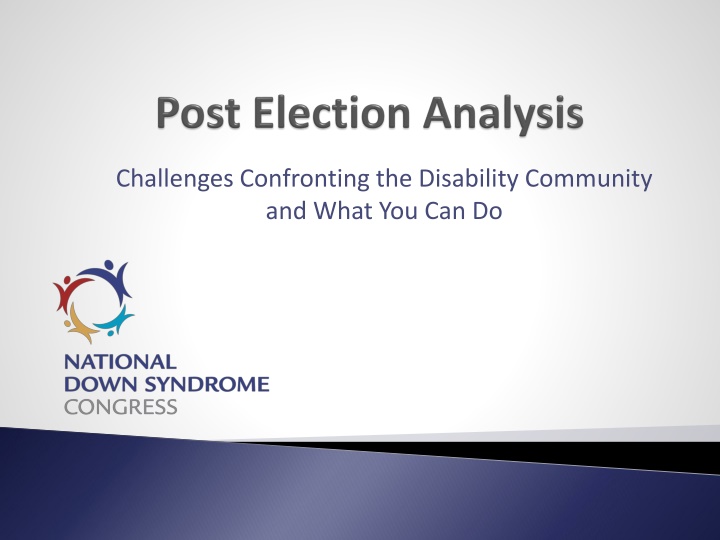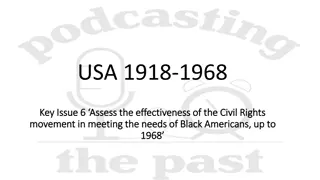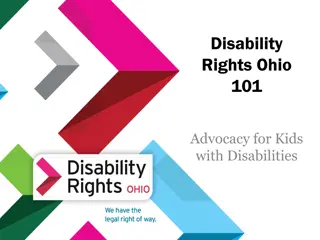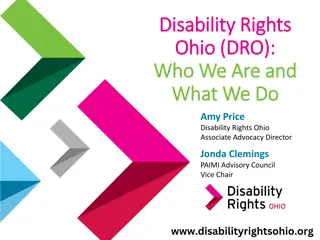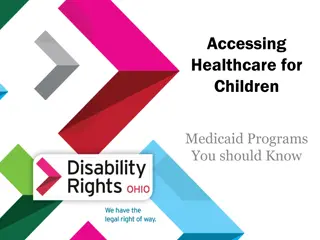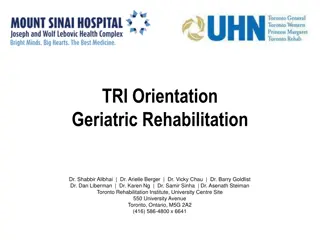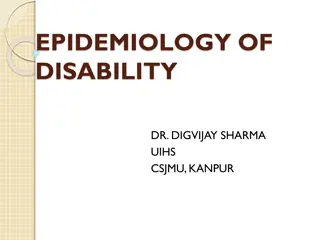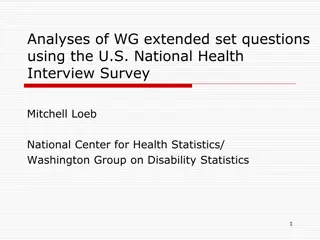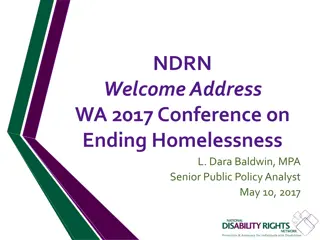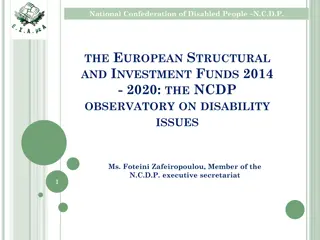Advocating for Disability Rights: Past Achievements and Current Challenges
Discussing the historical progress and recent threats facing the disability community, this webinar sheds light on the critical advocacy steps needed to defend civil rights, support services, and modernize existing systems. Emphasizing the power of grassroots advocacy, the speakers highlight the importance of self-advocates and family members in driving meaningful change at both federal and state levels.
Download Presentation

Please find below an Image/Link to download the presentation.
The content on the website is provided AS IS for your information and personal use only. It may not be sold, licensed, or shared on other websites without obtaining consent from the author.If you encounter any issues during the download, it is possible that the publisher has removed the file from their server.
You are allowed to download the files provided on this website for personal or commercial use, subject to the condition that they are used lawfully. All files are the property of their respective owners.
The content on the website is provided AS IS for your information and personal use only. It may not be sold, licensed, or shared on other websites without obtaining consent from the author.
E N D
Presentation Transcript
Challenges Confronting the Disability Community and What You Can Do
Welcome and Logistics Tamara Pursley, NDSC Communications Director Today s Presenters: Susan Goodman, NDSC Governmental Affairs Director Madeleine Will, Collaboration to Promote Self Determination Ricki Sabia, NDSC Senior Education Policy Advisor Stephanie Smith Lee, NDSC Senior Policy Advisor
In this webinar I will discuss progress over the past 50 years and current threats to that progress due to the recent elections. Susan, Ricki and Stephanie will discuss progress and threats in specific areas, and what advocacy steps we can take to: Defend civil rights, services and supports Continue to modernize and improve Advocate together on behalf of people with Down syndrome
Advocates Make the Difference! Our goal is to make the system work better for persons with Down syndrome. We can not allow our progress to be impeded or halted by those who oppose or misunderstand our goals. Advocates at the grassroots, meaning you, ARE the most powerful force we have and will have in advocacy. Self-advocates and family members are the best advocates. Federal level advocacy is paramount, but now state level action will be of great importance as well.
In 1975, first version of IDEA provided guarantee of education and FAPE, procedural safeguards and integrated settings. Later IDEA Improvements include transition services in 1986, access to general curriculum and due process protections in applying discipline rules (1997) The Rehabilitation Act reauthorized in 1986, included a definition of supported employment and authorized funding.
The Americans with Disabilities Act (ADA) of 1990 prohibited discrimination against persons with disabilities in employment, housing, transportations and other areas of life. The Olmstead v. L.C. decision the US Supreme Court held in 1999 that under the ADA individuals with mental disabilities have a right to life in the community rather than in institutions. Major bipartisan improvement in the Workforce Investment Opportunities Act (WIOA) of 2014.
The Department of Justice found that Oregon and Rhode Island relied too heavily on subminimum wages and sheltered workshops and required corrective action plans. The Achieving a Better Life Expectancy Act (ABLE) of 2014, permits individuals with disabilities and families to earn and to save without jeopardizing public benefits. BUT it is a slow, arduous and ongoing effort to attain equal opportunity in education, community living, employment and civil rights for persons with disabilities.
Many proposals for legislative and systemic change are being under discussion, including: Block granting, dramatic funding cuts, entitlement reform, and negative changes to key disability laws and programs. Many different viewpoints within our community and we must work to maintain a big tent. Disability is a bipartisan issue. We have a positive record of working with both Republican and Democratic Administrations and Congresses and will continue to do so. We are now at a critical point and face many challenges and potential dangers. We must be prepared to unite and advocate together.
Congressional Review Act (CRA): Congress can overturn any regulations issued by the Obama administration from approximately mid June to December 2016. If regulations are overturned the agency can t issue substantially similar regulations. Article on CRA http://www.reuters.com/article/us-usa- congress-regulations-idUSKBN14W2TO See NDSC Action Alert on related bills: https://www.ndsccenter.org/governmental-affairs-action- alert-january-19-2017/
Workforce Investment Opportunity Act (WIOA) incentivizes employment in inclusive settings and encourages phase out of sub-minimum wages WIOA now amends IDEA to prohibit schools from contracting with agencies that place students in jobs paying sub-minimum wages WIOA now requires more funding for transition-age students and extends the amount of time a person may receive supported employment services At risk of major dismantling and funding cuts
The process of repealing the ACA has already begun. What can be lost in repeal: Coverage for pre-existing conditions Prohibition against rates based on health status Children remaining on parent s policies through age 26 Medicaid expansion Ten Ways ACA Helps Older Adults and PWDs: http://bit.ly/2jKCSa8 Executive order impacting ACA regulations : http://wapo.st/2kjxOKZ
Urgent action is needed Tell your story Let your local and state policymakers and Members of Congress know how important covering pre-existing conditions, children remaining on parents policies, and other issues are to you and your family members.
Initially, a health insurance program for people living below the poverty level, Medicaid now provides health insurance and other types of critical supports for persons with disabilities. In the 1980 s Congress passed the Home and Community- Based Services (HCBS) waiver program which enables qualified persons to receive an array of optional services in the community instead of institutions, including residential and employment services. A new regulation now requires individual choice for Medicaid funded residential and employment services.
Many Members of Congress and the public do not understand that Medicaid funds virtually all long-term support services for individuals with intellectual and developmental disabilities. A Trump administration strategist announced this weekend that the Administration s health plan would include block granting Medicaid. Many members of the Majority party in Congress support block granting. NYT article - http://nyti.ms/2jRPZXa Block granting would shift control of Medicaid from the federal government to state government. States would have complete authority to decide who and what to cover, and many current services and supports will be eliminated by States, given the reduction in funding. Currently the federal government reimburses a certain percentage of state expenditures on Medicaid services (e.g., 40% of state expenditures) Block granting eliminates the federal match No federal rules on eligibility or services
Another negative proposal would impose per capita caps. There would be a funding cap for each individual, and many persons with Down syndrome have needs that would exceed the caps. These changes would result in the elimination of the entitlement to current Medicaid supports and services and the lack of funding would starve the Medicaid program.
Urgent action is needed Let your local and state policymakers and Members of Congress know how important Medicaid is to you and your family members. Write a personal story about how this affects you and email it to me at susan@ndsccenter.org Educate them about the impact block granting and per capita caps would have on you.
Endrew F. Supreme Court case about FAPE http://www.scotusblog.com/case-files/cases/endrew-f-v- douglas-county-school-district (amicus briefs) Roundtable on inclusive education requested by NDSC and sponsored by National Center for Educational Outcomes UDL implementation website and credentials/certification project General UDL info http://www.udlcenter.org/ Sign up for information on the project at http://bit.ly/2hWZIbM Intelligent Lives film by Dan Habib--an NDSC partnership https://iod.unh.edu/projects/intelligent-lives
Concerns about Secretary of Education nominee support for IDEA. FUNDING (cuts, vouchers, block granting) Implementation risks Cuts to Office of Civil Rights- discrimination claims, restraint and seclusion Federal regulations, guidance, monitoring, enforcement Reauthorization risks weakening or elimination of: Procedural Safeguards IEP requirements and supports/services Discipline protections FAPE LRE
Work on implementation issues in your state Discourage Congress from reauthorizing IDEA Fight for education funding Let your local and state policy makers and Members of Congress know how important IDEA is to you Ask your Senators to delay DeVos confirmation vote past 1/31 if necessary-until all questions are answered NDSC statement http://bit.ly/2j58qUk NDSC action alert http://bit.ly/2koclR7
Improved requirements for students who take alternate assessments: Emphasis on enrolled grade content Progress in, not merely access to, general education curriculum Proficiency = pursuit of postsecondary education or competitively paid, integrated employment Opportunity for every student to earn a regular diploma-also new alternate diploma provisions Development and use of accommodations to increase participation in general assessment Universal Design for Learning (UDL) More info at http://bit.ly/1nVgGt1 which links to our ESSA Summary and IEP FAQ doc
Critical accountability decisions are left to state discretion with limited federal oversight Delay of accountability regulations and state plan implementation due to Executive Order http://bit.ly/2iSfIQ0 Peer review of state implementation plans and assessments by US Department of Ed could be delayed and less robust than needed ESSA regulations could be repealed by Congress
Look up your states stakeholder activities at http://bit.ly/25cMbyZ Cut and paste sample NDSC comments and email to state department of education http://bit.ly/2csmmXr Review NDSC-NDSS-DSAIA webinar on ESSA state advocacy http://www.ndsccenter.org/political-advocacy/ (click on webinar archives) Sign up for Part III webinar on 1/26 http://www.dsaia.org/trainings Join with other advocacy groups in your state Respond to action alerts to retain ESSA regulations
Self-advocates and families key to new inclusive postsecondary education opportunities (PSE) for students with intellectual disabilities (ID) Now 246 programs (see www.Thinkcollege.net) at 2 & 4 year IHEs, some with residential living Research shows great outcomes in employment, social engagement and living more independently in the community
Allows students with ID enrolled in Comprehensive Transition Programs (CTPs) to be eligible for work-study jobs, Pell grants and Supplemental Educational Opportunity Grants for the first time. https://studentaid.ed.gov/sa/eligibility/intellectual-disabilities Authorizes inclusive model comprehensive transition and post-secondary programs (TPSIDs). https://www2.ed.gov/programs/tpsid/index.html Authorizes new National Coordinating Center at Think College at ICI Umass/Boston
Committee to Promote Inclusive Higher Education for Students with Intellectual Disabilities led advocacy efforts for these changes in HEOA 2008 and appropriations since then. Co-chair on behalf of NDSC. Now working with Congress to ensure ID provisions, with updating, stay in HEOA in reauthorization. Act on action alerts and sign on letter coming soon. Let your Members of Congress know this is important to you!
Serious concerns raised about new Administration and Congressional plans. No time to give up! We have faced and overcome challenges in the past: efforts to block grant IDEA, block grant Medicaid, eliminate funding for Supported Employment, dismantle IDEA We have not only fought off bad things from happening under difficult circumstances, but have also made significant progress in many areas.
In 1995 when Newt Gingrich became Speaker of the House and the Contract with America coalition took over the House, we almost lost the civil rights protections and key elements of IDEA. Disability advocates did not have relationships with Republicans and couldn t get in their doors. The disability community was fractured each organization pushing their own narrow agenda.
It took a three-year full-time extremely difficult effort, becoming united in what we advocated for, an extraordinary consensus process, and the involvement of families from across the country to turn that very bad situation around and pass IDEA 97 - a bill with extensive improvements to IDEA. NDSC was a leader in that effort and continues to be an advocacy leader, but we can only succeed if we advocate together.
We need to get ahead of the curve, be united as a community, and get recommendations into the Administration and Congress early to both Republicans and Democrats. Advocate with both Republicans and Democrats Members of Congress do care what their constituents think.
Work with non-partisan, non-profit organizations and coalitions Consider the priorities of the incoming Administration and Congress and ways we can create our messages in ways that appeal to their priorities. Creating jobs and increasing employment is a top priority of President Trump and Congress. Deliver clear messages about how the programs we are discussing today lead to employment and community living and are cost effective in the long term. Frame the debate in positive terms. Use your personal stories to show how the policies impact us and the people we care about.
Respond to NDSC action alertseveryone is needed: self-advocates, parents, family members, professionals Contact policy makers (visits, letters, calls, testimony, social media) Tie personal stories to the policy objective and be positive about importance to you Testify at hearings, request additional hearings, speak at committee meetings, town hall meetings
Be aware of time Staff are important too Act with civility, frame debate in positive terms, be clear about what you are asking, why Tie your personal stories to policy goal Offer to be a resource Take a photo and post/share Follow up: thanks, report back on advocacy
Get to know individual policymakers in both parties and their staff Invite them to walks or other fundraisers, picnics, events ask them to speak, say a few words, or at least recognize their attendance Take their photo with your group and share the photos with them, include in your newsletters and social media, and share with the media Speak with them at community events and the district (state) offices Become a resource and recognized expert
Encourage advocates to: Identify and post messages on policy makers Facebook pages Follow elected officials and their staffers on Social Media and Like their Facebook pages. Follow media on Twitter and post to news outlet s Facebook pages. Directly communicate with policy makers and media on Twitter by tagging them with @ before the username
To learn more about how to build coalitions, tips for using social media for advocacy, etc., read: NDSC 2015 Convention Pre-Conference public policy workshop http://bit.ly/2jNWl8a
Sign up for information and action alerts by joining the NDSC email list at https://www.ndsccenter.org/stay-up-to-date-with- ndsc-news/ Like the National Down Syndrome Congress Governmental Affairs FB page at https://www.facebook.com/dsadvocates/ Follow NDSC on Facebook at https://www.facebook.com/thendsc/ and Twitter @policyupdates
Attend the NDSC Convention July 20-23 in Sacramento and participate in policy and advocacy workshop sessions If you appreciate the work we re doing, please donate to the NDSC to support our policy work (Whether online or by mail, just put policy in the memo/comment section)
For further inquiries and support, you can reach us at ndsc@ndsccenter.org or susan@ndsccenter.org
